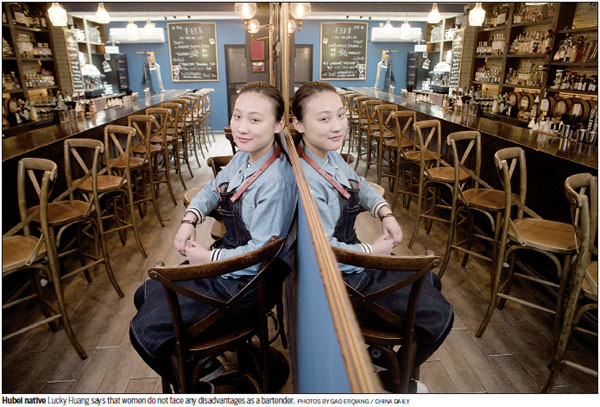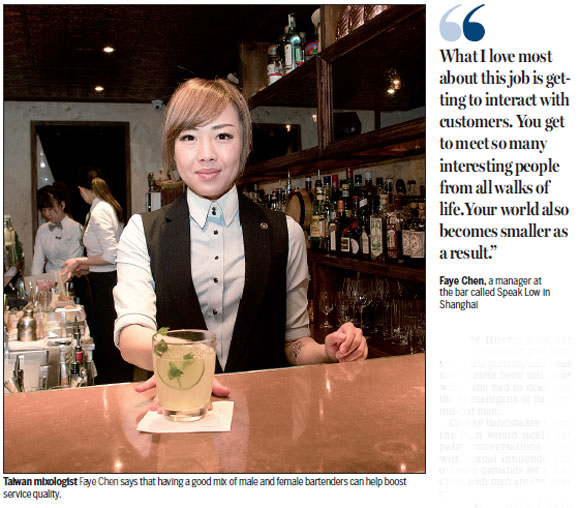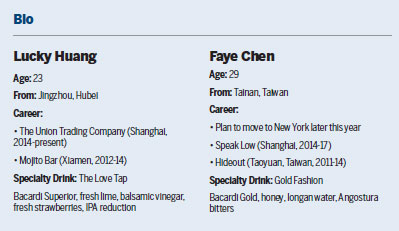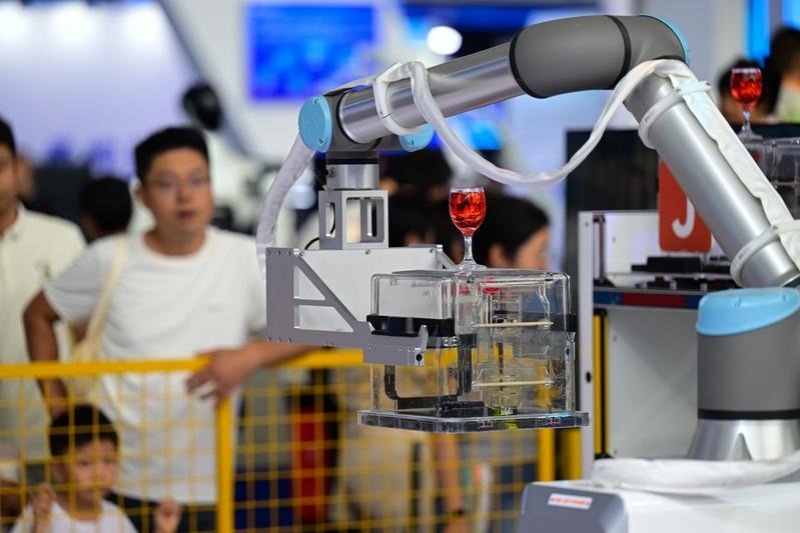Shaking things up

Ahead of International Women's Day, two female mixologists in Shanghai talk about their motivations behind joining a male-dominated industry and why more females need to be behind the bar counter
A trusted confidant. An expert at reading people. An artist who paints with flavors.
Most bartenders would say that their profession places them in such roles, and how they are not mere service staff whose only job is to satiate the thirst of nocturnal crowds.
Many of them would also cite the love for meeting new people as the main reason they got into this industry, one that is today still largely an all-boys club.
"What I love most about this job is getting to interact with customers. You get to meet so many interesting people from all walks of life. Your world also becomes smaller as a result," said Faye Chen from Speak Low, a speakeasy-style bar in Shanghai that was rated China's top cocktail establishment in the inaugural Asia's 50 Best Bars listing in 2016.
"Bartenders become confidants to their customers. After a few drinks, people tend to get a little more emotional and conversations become more intimate. We end up knowing very personal things about them, such as when they broke up with their boyfriends or girlfriends."
Chen's parents, however, did not share this romantic point of view. Faye said that they were initially apprehensive about her choice of career because, at least among people of the older generation, such a job is commonly associated with indecent men, cigarettes and alcohol.
"But they're now fine with me doing this because they've managed to see the fruits of my labor which proves this is a legitimate and respectable job. They've even come down to the bar a few times to see me at work,"quipped the 29-year-old from Taiwan.
One of her most notable accomplishments to date is winning the China edition of the Bacardi Legacy Cocktail Competition in March 2015.
Moreover, Chen isn't just a regular bartender at Speak Low - she also runs the operations for her boss Shingo Gokan, an award-winning Japanese mixologist who is among the head honchos at New York bar Angel's Share.
Holding their own
While she might be the most diminutive person working at the bar, it is evident that size and gender is irrelevant at this workplace.
Her male subordinates, most of whom are at least a head taller than her, address her "Faye Jie" at all times - it means "big sister Faye" - never once omitting the last word as if it could amount to gross insubordination.
Behind the bar counter, the pint-sized Chen is a figure of poise. She manipulates the bar tools before her with a confidence and deftness that reveals her experience. She dishes out orders to the junior bartenders with a subtle but discernible authoritativeness.
Speak Low's bar hostess Kira Grudinina, a 25-year-old Russian, aspires to be like Chen one day.
"I admire her a lot. My dream right now is to become a bartender and I look up to her. Faye can be really serious at work but she can also be a wonderful friend and manager. She has this softness inside which makes people feel like she's someone they can rely on," said Grudinina.
This "softness", said Chen, doesn't necessarily work against her. Instead, it can be a vital element in a bar's operations. She added that more women should become bartenders, citing how they are a little more compassionate, especially in terms of people management, and this in turn adds a different dimension to customer service.
Lucky Huang, who works at The Union Trading Company in Shanghai, shares the same point of view.
"Having a female bartender intervene in a situation involving rowdy customers might actually be more effective. Sometimes drunk customers get more agitated if they have to deal with a male bartender, but they tend to calm down when a woman gets involved," said the 23-year-old.
Born in Jingzhou, Hubei province, Huang had initially intended to become a barista instead of a bartender. She landed her first job at the age of 16 in a cafe in Xiamen that sold coffee in the day and cocktails at night. But because there was a need for more manpower in the evenings, Huang spent most of the time doing the night shift.
Eager to seek new experiences after four years in Xiamen, she sent Yao Lu, a well-known American Chinese bartender, a text message on WeChat when she heard that he was going to open The Union Trading Company in Shanghai in 2014. Huang has since become one of Yao's most trusted employees at the award-winning establishment, getting promoted from bartender to assistant bar manager. She had even gone on to finish among the top three in the Shanghai leg of the Bacardi Legacy cocktail competition in 2015.
"Lucky was one of the first to join our team and right from the beginning I could tell that she was not only hardworking but also more than capable of going pound for pound with the boys. She has a keen sense to detail and has throughout the past couple of years developed a great sense for hospitality," said Yao, whose bar came in ninth in the 2016 Asia's 50 Best Bars rankings.
When asked if female bartenders faced any disadvantages compared to men, Huang struck a defiant tone.
"Of course I would say that we're equal. There is nothing women can't do that men can, at least in a bar. There's really nothing to compare - we all have hands and feet, we can do anything and everything," said Huang.
In addition to mixing cocktails, Huang has to regularly contact alcohol suppliers to coordinate orders and delivery schedules. She said that she has never once faced discrimination.
Prejudice, however, does exist to a certain extent in the industry.
Yao said that he has heard of people talking about how they perceive women to be "weak", "too shy", "not able to physically handle the long hours" and "need to be cared after".
"It's ludicrous, all these misconceptions, but that's just what it is. There are a number of outstanding female bartenders in Shanghai - I think that's an indication that sexism isn't prevalent here," said Yao.
Carson Xie, the head bartender at The Nest, backed this notion.
"In fact, I'm looking to hire more men because women currently make up 60 percent of our bartending staff. The main barrier for women in this industry is societal perception. Old school Chinese parents just don't like the idea of their daughters working in a bar," he said.
Crossing the line
The other source of sexism is the customers.
While Huang does not usually encounter problems with male patrons, there has nonetheless been instances where she had to deal with the shenanigans of narrow-minded men.
Cheeky handshakes where the man would tickle her palm, conversations filled with sexual innuendo and outright demands for her to drink with men are the most common.
"All the places I have worked at are pretty sophisticated establishments. Still, there would be weird people who have this perception that if you're a woman and you're working in a bar, your job is to drink with them," said Huang.
"There will always be cases of sexual harassment. This is one of the biggest dangers for a woman in this profession."
When it comes to dealing with individuals who would not relent with harassment, Huang said that the best solution is to show them the front door in a polite yet assertive fashion before the situation gets out of hand.
Contrary to popular belief, drunk men aren't the worst type of people to deal with - it's actually drunk women who are more "vicious", said Chen.
"Seriously, drunk female customers are incredibly hard to reason with. When they make a scene, the first thing we do is dispatch one of our male bartenders to defuse the situation. If that fails and the female customer really wants to pick a fight, I'll gladly oblige. I know the bar better than them so I know where all the 'weapons' are at," joked Chen.
Mixology and creativity
Another reason why Chen and Huang decided to become bartenders is the creative process involved. Those who do not appreciate cocktails might argue that such beverages are merely a mixture of different spirits aimed at getting people inebriated.
But if that's really the case, why have a bartender prepare drinks instead of just pouring all the different spirits into a glass yourself?
Because it is the techniques involved that make all the difference, said Huang.
And that is exactly why there are bar tools. That is why some bartenders painstakingly carve balls or cubes of ice that fit snugly into glasses. That is why bartenders jiggle cocktail shakers. That is why James Bond likes his martinis shaken and not stirred.
"That thing we do with the shakers - it's not for show. It's a method of melting the ice so that it blends seamlessly with the alcohol. Shaking the ice and stirring it produces different outcomes. Sometimes it also depends on how much strength you use to shake the ice," explained Huang.
"Of course bartending, or mixology, is an art form. You have to find a harmony between varieties of spirits that taste different. It's the same as cooking."
In fact, when it comes to sense of taste, women actually have an advantage over men, according to scientific studies.
In 2008, an experiment jointly conducted by the Danish Science Communication and the Faculty of Life Sciences at the University of Copenhagen found this to be the case. According to a research project by Yale University, women have more taste buds than men, which means they have more sensitive palates. Over at the University of Florida Center for Smell and Taste, researchers found that women are more likely to be super tasters - individuals who have a far greater sense of taste than average folks.
But Chen likened cocktails to being more than just a combination of flavors, saying they are in essence an amalgamation of art, culture and history.
Indeed, mixology has been around for a long time - the earliest use of the word "cocktail" has been found to be in an American newspaper from 1806 - and the Prohibition Era (1920 to 1930s) in the United States is widely considered the most romantic period for cocktails.
Determined to improve her skills, Chen would be leaving Shanghai later this year to work at Angel's Share in New York, a city steeped in cocktail lore.
She conceded that she is also mulling over whether to open a bar with her good friend in the near future.
"I view mixology as an art form, and since New York has a thriving cocktail and arts scene, I believe the city can help me become more creative," said Chen. "The next few years will be really important for self-development. But I guess at some point in life, when the right person appears, I'll consider settling down and having a child. I'm a woman after all."
alywin@chinadaily.com.cn



(China Daily USA 03/03/2017 page9)
Today's Top News
- Japan's PM seen as playing to right wing
- Mainland increases entry points for Taiwan compatriots
- China notifies Japan of import ban on aquatic products
- Envoy: Japan not qualified to bid for UN seat
- Deforestation is climate action's blind spot
- Japan unqualified for UN Security Council: Chinese envoy






























